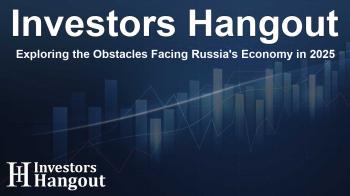Exploring the Obstacles Facing Russia's Economy in 2025

Challenges for the Russian Economy in 2025
The resilience of the Russian economy has been noteworthy over the past years, especially amid ongoing geopolitical tensions and sanctions. As the conflict persists, the economic landscape is evolving, presenting significant challenges that require careful navigation by policymakers. Economists predict that the year 2025 will be particularly challenging, with a confluence of factors leading to what some are labeling an ‘ideal storm’ for the economy.
Rising Inflation Concerns
One of the most pressing issues facing the Russian economy is inflation. In 2024, inflation levels soared to 9.5%, spurred by ballooning military expenditures and national security investments that are forecasted to dominate the budget in 2025. Inflation has dramatically influenced public opinion and continues to affect daily life, especially for the most vulnerable populations. Essentials like food items are experiencing steep price increases, and the decline in real pensions adds to the financial strain.
Government's Response
To combat inflation, the central bank has resorted to raising interest rates. President Putin insists that merely increasing interest rates is insufficient and has urged the government to focus on ensuring stable supplies of goods and services in the market. This multifaceted approach signals an attempt to stabilize prices while addressing the underlying economic issues.
Interest Rates and Their Effects
The central bank’s move to raise interest rates to an alarming 21% has drawn criticism from various sectors. While intended to counter inflation, the high cost of borrowing poses significant challenges, particularly for the civilian economy. Prominent business leaders have expressed concern that such high rates are stifling investment opportunities. With capital costs soaring, businesses face a difficult environment characterized by a profitability squeeze.
Risks of Bankruptcy
High interest rates could lead to increased corporate bankruptcies, particularly in sensitive industries such as real estate. Measures intended to cool lending, along with reduced state support for home financing, have only intensified the risks for businesses looking to navigate these turbulent economic waters.
Slowdown of Economic Growth
The anticipated economic growth for 2025 is predicted to decelerate to about 2.5%, down from a more optimistic 4% forecast for 2024. Analysts from economic think tanks highlight stagnation in many industrial sectors, which raises fears of stagflation—a scenario combining stagnant economic growth with high inflation. Labour shortages are compounding these issues, as many have left the workforce either due to military enlistment or emigration.
Future Implications
Economists caution that the lack of balance in government spending, especially directed towards defense, may lead to recession if these trends continue unchecked. Investors and economists alike are observing these trends closely, as the implications for both local and international relations could be far-reaching.
Budget Deficits and Financial Strain
The budget deficit presents another critical challenge, with deficits reaching 1.7% of GDP. To address fiscal pressures, the government has proposed tax increases, anticipating that this could help mitigate the financial shortfalls. However, the sustainability of such measures is uncertain, especially in light of sanctions affecting key revenue sources, particularly energy exports.
Taxation Adjustments
Some economists project that without significant shifts in military-related expenditures, ongoing tax increases may become necessary. These financial strategies will be scrutinized closely as the country attempts to strike a balance between funding needs and economic growth.
Currency Volatility and Economic Impact
The Russian rouble has seen significant fluctuations, particularly in response to sanctions that have restricted foreign currency transactions. While a weaker rouble may assist in closing the budget deficit, it inevitably introduces further inflationary pressures, particularly on imported goods. The shift towards alternate currencies, such as China's yuan, underscores the dramatic changes in Russia’s foreign exchange landscape.
Transforming the Forex Market
The sanctions have drastically altered how Russia engages with the global financial markets, leading to a reliance on less transparent methods of conducting foreign trade. These developments contribute to the uncertainty surrounding future economic predictions.
Frequently Asked Questions
What are the five main challenges facing the Russian economy in 2025?
Key challenges include rising inflation, high interest rates, economic slowdown, budget deficits, and currency volatility.
How has inflation impacted the Russian population?
Inflation has led to increased prices for essential goods, affecting purchasing power, particularly for vulnerable groups in society.
What measures is the Russian government taking to counter high inflation?
The government is raising interest rates and calling for stable supply chains to manage price growth and inflationary pressures.
What economic growth rate is projected for Russia in 2025?
The projected economic growth rate for Russia in 2025 is about 2.5%, a slowdown from previous years.
How are foreign sanctions influencing Russia's economy?
Sanctions have restricted access to foreign markets and significantly impacted revenue, further complicating efforts to stabilize the economy.
About Investors Hangout
Investors Hangout is a leading online stock forum for financial discussion and learning, offering a wide range of free tools and resources. It draws in traders of all levels, who exchange market knowledge, investigate trading tactics, and keep an eye on industry developments in real time. Featuring financial articles, stock message boards, quotes, charts, company profiles, and live news updates. Through cooperative learning and a wealth of informational resources, it helps users from novices creating their first portfolios to experts honing their techniques. Join Investors Hangout today: https://investorshangout.com/
Disclaimer: The content of this article is solely for general informational purposes only; it does not represent legal, financial, or investment advice. Investors Hangout does not offer financial advice; the author is not a licensed financial advisor. Consult a qualified advisor before making any financial or investment decisions based on this article. The author's interpretation of publicly available data presented here; as a result, they should not be taken as advice to purchase, sell, or hold any securities mentioned or any other investments. If any of the material offered here is inaccurate, please contact us for corrections.
